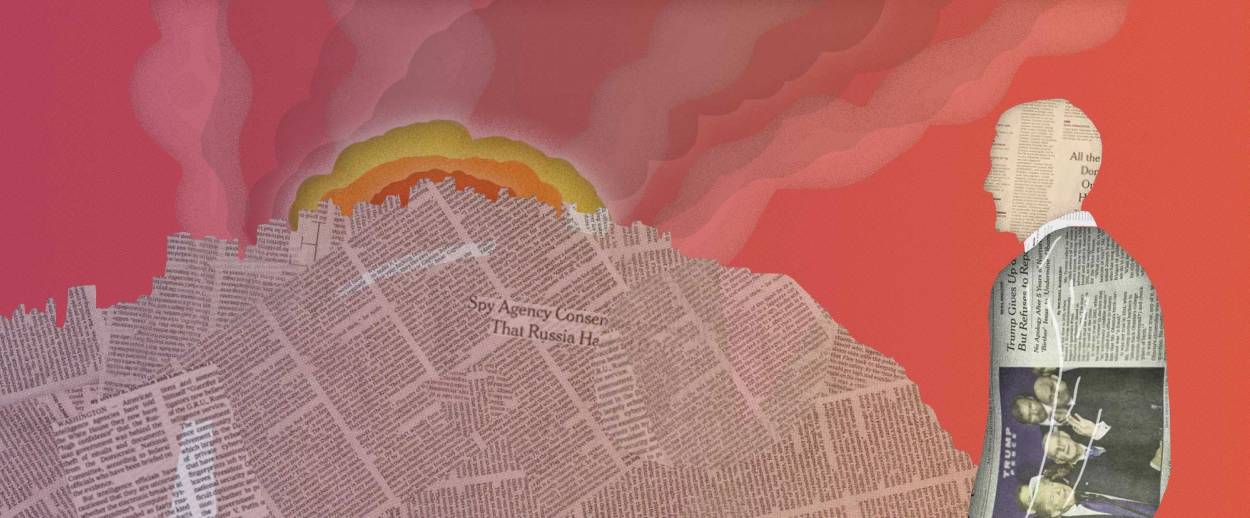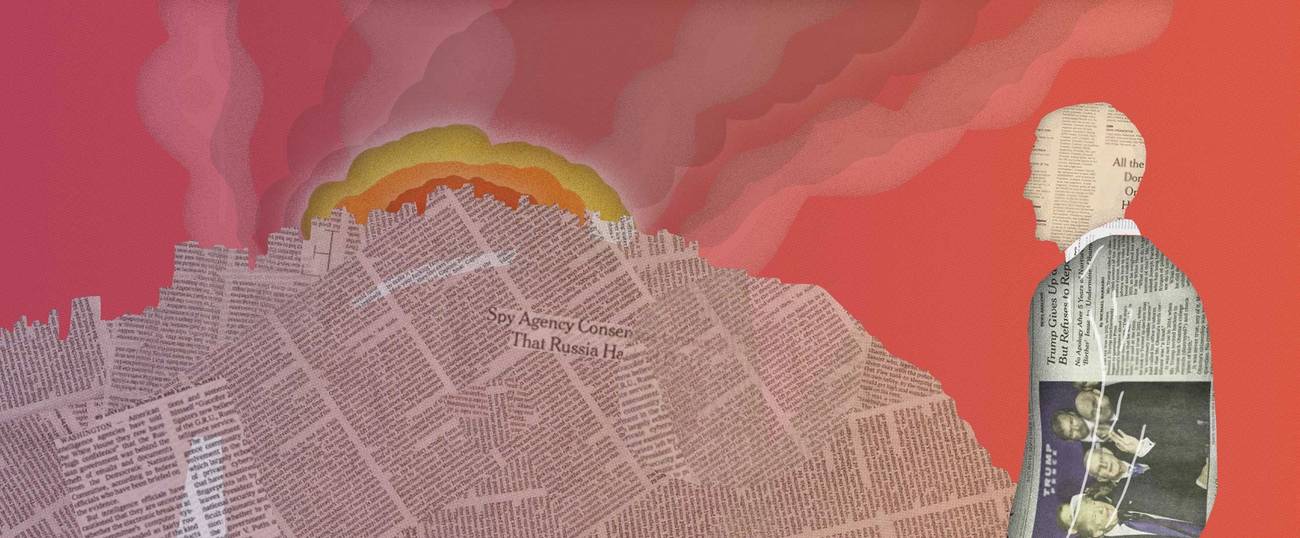First-Person Politics: Dispatch From Trumpville
‘In retrospect, I clearly ignored too much of my own anecdotal evidence.’




With a month having passed since the election of Donald Trump, I have found myself doing lots of reflecting on things that, in hindsight, I should have paid more attention to. One such memory comes from what should have been a cathartic moment—voting. I had waited in line for no more than 30 seconds when the man behind me imprinted himself in my memory. He was older, and white, and wearing a Tennessee Volunteers hat, which you don’t necessarily see often in Florida, a state with its own share of notable college-football programs. And he was with his wife, who was also older, and white. And I remember the first thing I heard him say.
“You ain’t voting for that medical-marijuana shit, right?” he asked his wife. I rolled my eyes. Good thing I was in front of him.
“Well, they say it helps. I read that in the paper,” she answered.
“Ah, you believe that shit, you probably believe Hillary shit.”
I was not surprised that the man held these two beliefs. But I would later be surprised by how many in America—or at least in certain states—shared his views.
In retrospect, I clearly ignored too much of my own anecdotal evidence. I ignored the people I knew who supported Trump. The friend who loves Obama, but voted for Trump and thinks Hillary Clinton was involved in dozens of murders and would have destroyed America—you can make your own judgments on said friend’s knowledge of American politics. I ignored the handful of Jews I knew who voted for Trump because “Hillary hates Israel”—a relatively small portion of our community, but nonetheless one that I have heard repeated not just in parts of the United States but even deep in the heart of Jerusalem, during a lunchtime meal and delivered from the patriarch of a very observant family one Shabbat in May of 2015.
“Obama’s bad enough for Israel, but what about that demon Hillary?”
It was quite a comment for the Sabbath.
I ignored the people I saw on CNN, everyday Americans with strong Pittsburgh accents, who were enthusiastically pro-Trump. I ignored Ken Bone, who admitted that a vote for Trump was against his livelihood but also against his better judgment—a choice that is easy to make in theory, but much harder in practice—and who later refused to reveal who he voted for (by and large, Trump was the only candidate people were sometimes afraid to admit supporting). I ignored the people on my Facebook newsfeed and on Twitter, sharing “news” articles fresh out of the Russian disinformation campaign oven.
I even ignored acquaintances who seemed to have no concept of the idea of consent. “How can you support someone who brags about sexually assaulting women?” This was a question I posed many times to people. Every time, I got a similar response. “Oh, come on, he was just saying that. He didn’t actually do any of those things.” One friend, wanting to really prove me wrong, was clever to add another point. “Bill Clinton is a rapist.” My brother had a friend who went the extra mile. “Trump couldn’t have done those things he said—he’s a family man with a family business!”
Of course, I wasn’t all wrong. More people voted for Hillary Clinton than for Donald Trump. But because the electoral college no longer functions as a check on the excesses of the electorate—as designed, and as described by Alexander Hamilton in Federalist 68—but rather merely as confirmation of the winner of each state, Trump won the election, and the presidency.
The things I refused to see became quite real to me when I was recently in Jacksonville Beach, Florida. I noticed, as I had failed to when I was there in June of 2016, that seemingly every third house had some sort of Trump poster, or a car with a “TRUMP” bumper sticker parked in the driveway. I happened to be staying in a home of four Trump voters as well—though the amount of support they had for their candidate, and their interest in politics after the election—varied. While one member made an excited comment predicting “Trump will be the best president ever”—I, being a guest, avoided the bait—others seemed more than happy to mock his various flaws. Of course, this friend was also once basically unable to verbalize Trump’s supposed business (or, I suppose, in this case, general) acumen.
“That guy, man, he can just … I mean … that guy really can do everything.”
Now, we are less than a week from Donald Trump, a career con man and misogynist, taking the reins of power. While still not inaugurated, he has managed to cause several diplomatic incidents (most notably with China), signaled his intent to openly violate the Emoluments clause once he is in office, and publicly lambasted a local union official from the now infamous Carrier plant that he “saved” resulting in the man, Chuck Jones, to receive threatening messages and harassment from enraged Trump followers. That last action—and note that, one way or another, Trump’s tweets have been either a catalyst or added fuel to the fires of these incidents—should be familiar to regular Tablet readers. Just as we have seen Hamas and Fatah use Facebook to incite stabbings, Trump’s attack on an ordinary U.S. citizen quickly becomes a potential source of incitement. But this was not Trump’s intent—he was just reacting to Jones’s criticisms. Trump can’t handle criticism, so, like any middle-school bully, he attacks to cover up his own insecurities and problems. It’s par for the course for Trump to target specific people or companies on Twitter, but now that he has a devoted (quite frankly, cultlike) following and the power of the office of the president, his Twitter attacks have become far more serious than they were in 2013.
It’s perhaps a bit odd to point out some of Trump’s more obvious flaws in a piece that is largely about my own failure to see his impending victory. However, the fact that I can acknowledge this—as can many people, when they are wrong about something—seems to mark a clear difference between this writer and the president-elect. The fact that I can say, quite publicly, that I was wrong about the election displays a level of humility that Trump would find disqualifying. Humility, like Bob Corker’s short stature, or John Bolton’s silly mustache, are the kinds of things that Donald Trump just can’t relate to.
But there it is. I was wrong. I was wrong about Trump’s chances. I ignored the signs that were quite literally in front of me. I ignored friends, acquaintances, strangers, anyone who clashed with my idea of the race’s outcome, which I gleaned from, well, articles I’d read in the media. Now, perhaps for the first time in my young life, I’m living without thinking I know what is coming next.
I do not know how Trump’s presidency will unfold. I do not know how blatant the corruption and graft that his administration and his family engages in will be. I do not know what will happen to the less powerful and less fortunate in this country, especially those groups that will certainly be targeted by Trump’s administration. I don’t even know what will happen to us Jews (though recent events in Montana and Pennsylvania seem to foreshadow dark things)—though we have so far been spared a direct attack by Trump.
The only thing I do know is this: I’m angry.
***
Read a dispatch from Hillaryland here.
David Tenenbaum is a freelance writer and musician from South Florida.